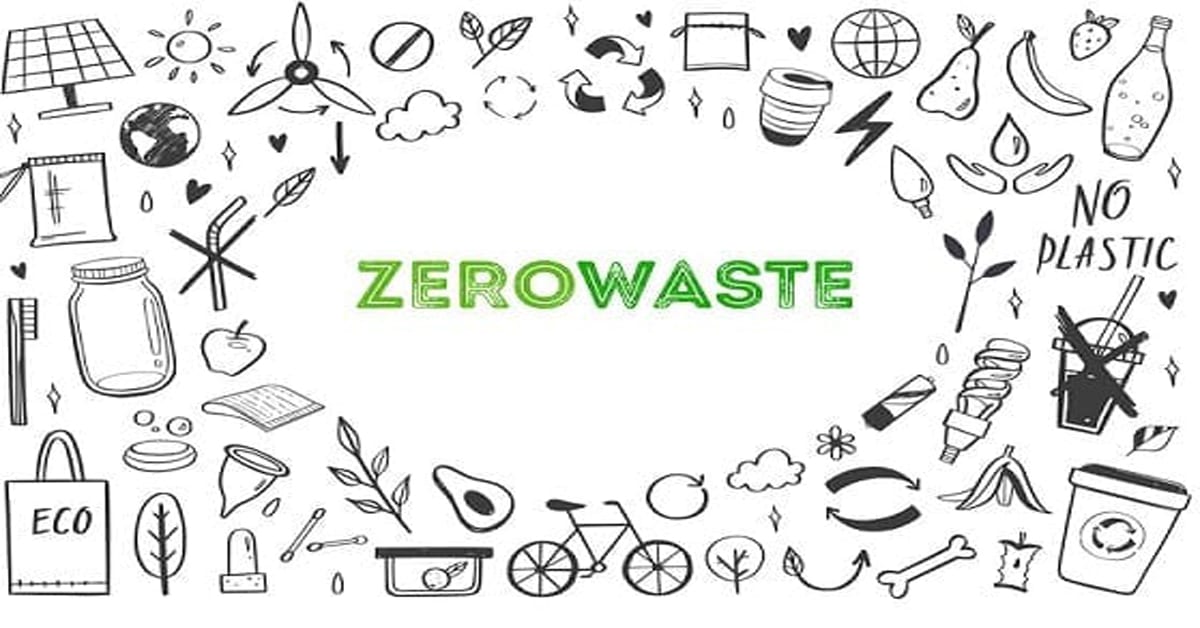Zero Waste Lifestyle. You probably heard people talking about this on social media; or seen brands slowly transitioning to cater to people who are into this type of living. You might be among the many who keyed in these three words in a search engine out of curiosity, or better yet, you are someone interested to join the advocacy. Whatever the situation is, you are brought here for a reason: to learn more about the zero waste lifestyle.
These past years, the movement is slowly gaining prominence among people of ages, genders, and nationalities. Some perceive this as a solution, while others speculate this is a mere trend. But how should we view this lifestyle change? To answer that, take a look at the following headlines, and you’ll soon find out why more people are shifting to a zero waste lifestyle.
“Microplastics found in gut of animal on one of the most remote islands of the world” – CNN
“World has six months to avert climate crisis, says energy expert” – The Guardian
“The UK is ‘acutley vulnerable’ to the impacts of climate change” – Environmental Journal
“Arctic Circle sees ‘highest-ever’ recorded temperatures” – BBC News
“Namibia’s last wild horses face a perilous future” – CNN
“Whales ending up on shores with several bags worth of plastic in their bellies.” – The Vox
“By 2050, there will be more plastic in the sea than fish.” – The Guardian
“Rising sea levels could wipe out mangroves by 2050” – The Verge
Are these headlines familiar to you? Does your community have their own version of the events reported? Whatever is true, one thing is made certain—we are facing an environmental crisis.
The Rise of The Zero Waste Lifestyle

We heard the news. The world is facing terrors. We know because we also have our own taste of panic. Every day, we see how the world around us changes so rapidly, but for the worse. We’ve seen the Amazon forest on fire, the aftermath of typhoon Haiyan in the Philippines, and now, the pandemic.
We know because we have a connection with nature. Our lives are dependent on it. We live in biodiversity: inhabits on the same land and breathes the same air. Our basic needs—food, shelter, and clothing—are all accessible from the environment. So with these accounts on hand, we sure know that the impacts are global. And what we can observe today are only visions of the future consequences.
Indeed, we are in the midst of a planet crisis.
The prime movers of zero waste traced back the catastrophic natural events to the human lifestyle. Our overly selfish way of living has caused pollution over oceans and river streams, air, and land. Soon, our children and the later generations might not have a habitable planet to inherit. An urgent change is needed.
A particular solution shows promise: joining the Zero Waste Movement. In the past 10 years, this lifestyle change grows in popularity. Names of both female and male personalities set the bar of a clean and green way of life. Some of them are responsible for changing the way we pack things or buy goods, even the way we dress. They showed that the movement involves the responsible consumption of products from food to clothing to recreation and household activities.
The zero waste lifestyle movement is also concerned with reducing and eliminating our trash. Moreover, it changes how we perceive the things around us. The movement is a reflection of how we live.
That said, zero waste requires a drastic lifestyle alteration. It has already been practiced even before the name became known. If other people can do it, you can do it, too! Everyone can participate in contributing to the preservation of the environment.
However, many misinterpretations make zero waste beginners skeptical. Let’s break these myths before they even crush our zero waste living spirits.
Common Misconceptions About Zero Waste
Here are some of the most common Zero Waste misconceptions:
The famous trash jar
“Zero Waste” may oftentimes be associated with mason jars or the no-trash-at-all concept. While the intentions of this practice are noble, these notions do not represent Zero Waste at all.
First, the Zero Waste Movement is based on reality. It is sensible of the environment, thus, campaigning for environmental awareness. Because of this, they find “having no waste at all” as something that isn’t feasible, something that is too idealistic. All of us end up wasting something or the other. The critical point is to know where you are unnecessarily wasteful and curb that part.
Also, the trash jar touted by zero waste personalities such as Lauren Singer and Bea Johnson? It doesn’t tell the whole story of zero waste. It’s misleading and doesn’t account for energy/resource waste or recycling. There’s so much more to zero waste than that. Instead, zero waste is changing how we interact with materials, as the famous zero waste pioneer Eric Lombardi believes. Well, we will get to that later.
This also establishes the idea of perfection – which the zero waste movement certainly doesn’t advocate for. After all, zero waste is not a goal or a contest but a journey. Instead, you should see what trash you’re making and figure out how to eliminate it.
DIY everything

You don’t have to make everything at home to be zero waste. Yes, there is some stuff you can DIY, such as makeup, soap, or herb mixes. Activities like this can improve your finances and perspective on things. But this is not the “be all, end all” of zero waste.
Rather, DIY-ing is a band-aid solution to the big problem in the picture. Major industries don’t give everyone access to the products we actually want or need with little to no wasteful packaging.
The do-it-yourself process is a transition until you have better options in the market for your necessities. Besides, DIY-ing is not a realistic production model in the long run for families. The most important thing is to make what you can. Then look for better, more sustainable ways of procuring things that you cannot source independently.
Out with the old plastic, in with the new reusables.
Most zero wasters recommend using up all your old disposables and plastics before replacing them with sustainable alternatives. In fact, they advocate for saving money and trash by not immediately throwing away your current plastic wares. You don’t need to discard plastics immediately, don’t buy or get new ones any longer.
Zero Waste living is expensive.
Many think that the zero waste movement is elitist because you can only do it with bulk stores, bulk bins, or farmers’ markets. However, the stores mentioned above are not the only sources of zero waste groceries.
You can buy unpackaged produce from most supermarkets, loaves of bread from bakeries, and buy food with fewer plastic bags – you just need to ask store managers. Or you could buy in bulk and save more money on less packaging, even if it’s plastic.
You don’t have to cough up big bucks to shop with zero waste. You just need to be creative on the way you shop. The greater you use reusable items, the more savings you have because you do not have to pay for continuously using plastics.
Zero Waste living is feminist.
With the many female changemakers behind the movement, many may think that zero waste is feminist. The contributions of women to zero waste are perceived as vital. They are cherished. However, contrary to the popular notion, there are men in the zero waste community. Males also take active roles, and they have been there since the beginning of the movement.
Zero waste activities for men are also abundant. They can enjoy these activities without being intimidated or misrepresented because of their gender.
But what is zero waste really?
The term “zero waste” first came about in the 1970s. Ph.D. Yale chemist Paul Palmer founded Zero Waste Solutions. The company started to obtain excess, unwanted laboratory chemicals free from many sources and reselling them for half of their original, quite high prices. Although it closed in the nineteen-eighties, Dr. Palmer was able to influence the zero waste lifestyle through his 2005 book, Getting to Zero Waste.
However, even before the term “zero waste” was coined, the movement was already in motion. The Zero Waste Movement began in 1996 with a protest on the plaza in front of Coca-Cola’s headquarters in Atlanta. Twenty-five people marched and chanted about Coca-Cola breaking their promise of using 10-percent recycled content in their bottling process. The leader of that group was Eric Lombardi. He was the first to push the vision of zero waste living in public and through media.
Recycling was no longer enough to solve the issue of waste overload in the environment. Rather, the journey people must take now is one where we make the world use fewer resources, eliminates toxic materials, builds things to last, and is then easy to reuse, recycle, or compost at the end of its intended uses.
From the onset of the movement, Lombardi said, it was never about perfection. It wasn’t a simple fix such as “zero landfilling” or “100-percent recycling”. Such a thing would place everything on the consumer. Zero waste is a journey, not a goal. It is a lifestyle, not a contest.
Being a successful zero waster was diverting 90 percent of trash from the landfill. This percentage is feasible and realistic enough but not demanding too much from people who want to live the zero waste lifestyle.
Rather than “Zero Waste,” the movement is all about promoting the “Zero Waste…Or Darn Near” slogan. The latter term supports the need to shake up the recycling industry out of its current slumber and get back on track changing the world for the better.
Zero Waste as a Solution
As a lifestyle, the zero waste movement affects all aspects of our being. While it is mainly beneficial to the environment, as this article emphasizes, going zero waste also improves our moral and spiritual standing, decision-making, and health.
Zero waste lessens pollution.
It’s not a secret. Zero waste protects and preserves our planet. In our daily activities, we produce unwanted wastes that usually goes to the environment. For instance, our way of transportation contributes to 28% of the greenhouse gases produced. Meanwhile, the use of products from our homes and in the workplace adds 12% more hazardous gaseous wastes to the environment.
More than we do, our Mother Earth suffers the most. The unrecycled plastics end up in landfills and oceans, and the many more toxic wastes from factories or even from homes pollute the elements of nature—air, water, and earth. But since zero waste is concerned with reducing the use of unnecessary things—from packaging to consumer goods—we also give the Earth a break from all the stress of pollution.
Zero waste preserves resources.
Speaking of products, the stuff we use on an occasional and daily basis comes from the environment. For instance, the reams of bond paper you just printed out in school or at work came from trees. The petrol you just filled your tank is from beneath the grounds. Whatever stuff you had on your desk is produced by factories that probably use coal or natural gas in manufacturing.
While obtaining things that we need aren’t bad at all, having products from or produced from unethically resourced raw materials or irresponsible processes must be a pang in the chest.
However, in zero waste, enthusiasts are inspired only to buy products that do not harm the environment. Advocates, including you, are turned into wise consumers. This contributes to the conservation of natural resources.
Zero waste saves money.
Still, thinking zero waste is expensive? Stop the worry. Zero waste actually saves your money. Before going zero waste, a lot of us may enjoy meaningless spending or hauls. We think we buy what we need. Later on, we may find out that only half of what we purchased is useful. Thus, the rest goes to the trash (sooner or later).
In zero waste, movers are shaped to redefine their “needs.” They are also urged to think about how products contribute to various forms of pollution. For instance, a product may overly use plastic in packaging, or the product may have a one-time use. If this is so, zero wasters will most likely skip purchasing this item.
The movement also encourages bulk buying as this can save money that we pay for packaging, transporting, or consuming goods.
Moreover, zero waste focuses on long-lasting and quality products. When you go zero waste, it is a must to use reusable. Doing this can help our finances a lot, as we do not have to deal with items that only go to the trash after a couple of uses.
Environmental and social responsibility goes hand-in-hand in zero waste. This approach honors the marginalized community, including women, artisans, local farmers, and more.
Small businesses inspired or adopting a zero waste lifestyle prioritize smaller communities in sourcing, processing, and crafting their products. They also allow ample amount to help these people by providing their needs or involving them in meaningful activities.
Going zero waste leads to healthier lifestyle.
Most foods available in the supermarket have an environmental setback. For instance, they may have unnecessary plastic packaging or be manufactured irresponsibly. What happens when you cut them out of your diet? Surprisingly, you spare your body from the junk as well when you choose zero waste shopping. Most products available in the market are packed with harmful ingredients. Meanwhile, food that is sourced in ethical ways is commonly organic, uses plant-based packaging, or is package-free!
Cooking zero waste recipes is also good not only for the environment. It is highly beneficial for your family, too.
Besides, zero waste leads you to choose activities that are actually healthy as well. For instance, you can enjoy new hobbies such as walking, hiking, or gardening as leisure. This makes you both physically active and eco-friendly as well.
A zero waste lifestyle favors circular economy.
The vision of a circular economy and a cleaner environment is at the heart of the zero waste movement. After all, the consumer can only do so much with the resources he or she can access.
The companies and the economic power makers have the biggest roles to change the linear economy (which sees many disposables go to landfills and pollute the earth) into a circular economy.
Pressuring and demanding our economy to move to a circular economy is tantamount to waste removal. With this type of economy, everything is meant to be reused over and over again. Meanwhile, the linear economic model of today treats most things as only suitable for one-use.
This is zero waste living – to advocate for a cleaner environment through a circular economy by living it yourself.
Going zero waste makes you a better person.
Zero waste is concerned with how every action affects others. When you embrace the zero waste lifestyle, you’ll be more mindful of others than you ever imagined. It will also teach you to become a wise decision-maker as you always think of the consequences before jumping to conclusions.
Moreover, it enhances your relationship with your family and friends, people in the community, and the planet as well.
Conclusion
Living with zero waste is practical and should be actively encouraged because it is one of the best ways to protect the environment. When we use our lives to do that cause, we make strong gestures of our love and support for the planet.
Rather than being overwhelmed by all the hype (trash jars and all) and intimidated or fooled by misconceptions, we need to look deeper into our lifestyle and where it comes from.
Striving to be zero waste is not just to lessen pollution from the consumers’ side, but more so to pressure companies and manufacturers to change how they produce – to make their production process more sustainable.
At the end of the day, the lifestyle we choose reflects our overall motivation. If we choose zero waste, we choose to be loving and mindful. We opt for a better future. We decide on a better planet.
We all have roles to play in saving the only habitat we have. So today, ask yourself this: What role do I play?




Great post! It’s so true what you said about zero waste living being a journey, and I think the same goes for veganism. We don’t need 1 person doing it perfectly, we need 100s of people doing it imperfectly!!
– Charlotte / charlottesspaceonline.blogspot.com
We try to cut back on how much waste we have. I do feel guilty sometimes. What are some of your favorite products to use to stop using single use plastics, etc.?
*This really answered my problem, thank you!